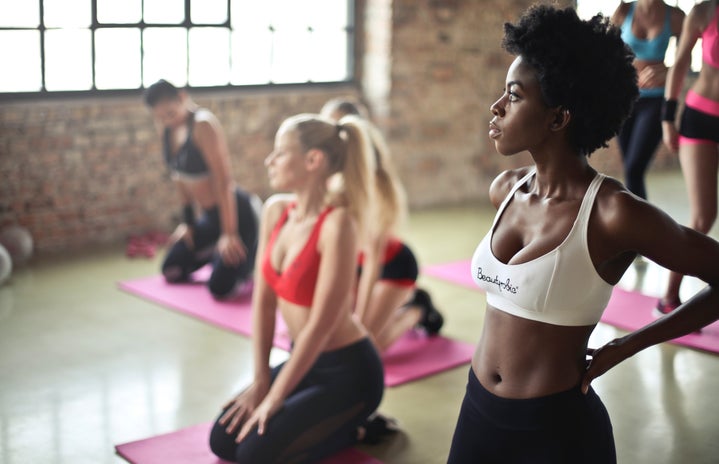You’ve heard it before, and you’re about to hear it again: working out can, and usually will, drastically improve the state of your mental health. I know, I know. It can be annoying to hear this piece of advice over and over again. As college students, most of us are far too busy to find the time to workout during the week, and on the weekends, all we want to do is relax. We’re so busy juggling school commitments, club activities, social endeavors, and the basic functions of human life (you know, those things called food and sleep) that exercise isn’t on our radars.
I never worked out during my freshman year of college. How could I? I was navigating a new life in a new city with a much heavier workload than I had in high school. Finding the time to be fit seemed impossible. It wasn’t until my anxiety took a drastic turn for the worse during the latter half of my freshman year and the fall semester of my sophomore year that I realized I needed to make a change. I was already journaling and going to therapy, and I was an organized and efficient student—what else could I do to improve my mental state?
The answer lay in exercise. I’ve never been a very active person; I rode horses competitively for my whole life, but I couldn’t handle any “conventional” athletics. The gym was too intimidating, and I couldn’t find the time to go to any workout classes when I was swamped with homework.
That being said, I knew I needed to make a change. So I downloaded the Sweat app on my phone! I’m not going to lie, this app is tough, especially if you aren’t used to working out. I found myself getting easily discouraged when I first started working out regularly, as I wasn’t able to complete the exercises. On days when I didn’t have time to exercise, I felt guilty. It wasn’t until I started reading the stories of other members of the Sweat community, and the motivational Instagram posts of founder Kayla Itsines, that I gained my positive outlook on exercise.
The transition towards exercising regularly isn’t easy. The key to getting in that fitness groove is to find an exercise you can actually look forward to, whether it be a motivational spin class at SoulCycle, an exercise class (that counts for academic credit!) at BU’s fitrec, a bike ride along the esplanade, or using a couple of different workout apps at home like I do. The list of possibilities goes on and on!
I used to dread exercising, and on some days it’s definitely easier than others to get sweaty. However, it really has helped my mental health. As a person with generalized anxiety disorder, exercising helps give my schedule some regularity—it’s one thing that I know I can do every day, no matter what. I’ve started to prioritize exercise so much that I now wake up at seven o’clock in the morning to get my fitness in before class! This continuity in my mornings helps me start every school day off on a positive note.
Fitness is proven to help with a variety of mental health issues. While it helps me with my anxiety by giving my brain something positive to focus on, it can also help with depression by creating a sense of purpose in the person’s life—not to mention that exercise releases endorphins, which are key to a person’s happiness and positive mental state. In fact, working out is so good for the brain that it’s often one of the first solutions that many therapists recommend to patients.
I guess my whole, rambling point here is this: it can be extremely difficult to find time for yourself, even a little moment of self-care, when you’re under the pressure of a mental health issue. Exercise is a productive, healthy, and scientifically-proven way to help turn that frown upside down. Yes, it will be tough at first. But when the going gets tough, the tough get going… and remember, there’s always a bright side!
Want to keep up with HCBU? Make sure to like us on Facebook, follow us on Instagram, check out our Pinterest board, and read our latest Tweets!


